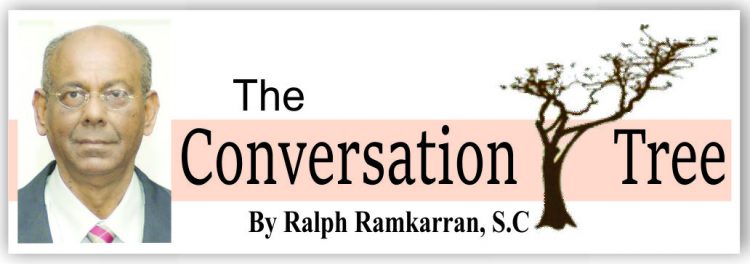
Guyana’s lawful sovereignty over Essequibo was conferred by the Arbitral Award of 1899. This Arbitral Award was and is recognized in international law and by Venezuela by public statements and by approving the 1905 demarcation until 1962 when Venezuela withdrew its recognition. In the headline and the Preamble of the Geneva Agreement of 1966 the word used three times to describe the issue between Guyana and Venezuela is “controversy.” The “controversy” is defined in Article I as having “arisen as a result of the Venezuelan contention that the arbitral Award of 1899 about the frontier between British Guiana and Venezuela is null and void.” If, therefore, there is a “dispute,” it is Venezuela that “disputes” Guyana’s lawful sovereignty. If there is a “dispute” on Guyana’s part, it is a “dispute” over “the Venezuelan contention that the Arbitral Award of 1899….is null and void.” It is not, at this point, a “dispute” about sovereignty.
Prior to 1899 there was a dispute as to the boundary between British Guiana and Venezuela. British Guiana, through Great Britain, claimed much more territory than it was actually awarded, including the mouth of the Orinoco. Venezuela was awarded some of the territory claimed by Great Britain, including the mouth of the Orinoco. It is only if the Arbitral Award is vitiated, a “dispute” once again emerges because the boundary that currently exists would no longer be lawful. A new boundary would have to be determined, presumably by a new arbitration process. Guyana would then be in a position in this “dispute” created by a vitiation to reclaim the territories that it had claimed at the arbitration in 1899, including the mouth of the Orinoco, that it lost to Venezuela in 1899. The nomenclature is important because much of the foreign reporting on Venezuela’s referendum and its aftermath, referred incorrectly to the “dispute,” not about the Arbitral Award of 1899, which is the real issue between Guyana and Venezuela, but about which country is entitled to Essequibo.
In a 12-page decision the International Commission of Jurists (ICJ) describes the issue between Venezuela and Guyana as a “dispute” 11 times. It did not once use the word “controversy” by which the issue is described in the Geneva Agreement. In the Separate Opinion of Judge Robinson, which is dealt with below, the word “dispute” or “disputed territory” is used 23 times in a 2-page+ decision. There is little difference between the meaning of the words “dispute” and “controversy.” Thus, it can be said that there is a “dispute” between Venezuela and Guyana in relation to the Arbitral Award of 1899 which Venezuela says is “null and void” and which Guyana denies. But the word “controversy” and not “dispute” was used in the Geneva Agreement. The use of the word “controversy” in the Geneva Agreement implies a distinction between the interpretations relating to the validity of the Arbitral Award, and who currently holds title to the Essequibo.
This is confirmed by Judge Robinson in his Separate Opinion. While Judge Robinson agrees with the Order of the Court, he expresses disagreement with the description of the “territory in dispute” as “Guyana administers and exercises control over that area.” He points out that the same situation that exists today existed since 1899, as the Order states: “….the territory which forms the object of that dispute was awarded to British Guiana in 1899.” His conclusion is here quoted: “Thus, from that time to 1966, British Guiana exercised sovereignty over the disputed territory and, from 1966 to the present time, independent Guyana has exercised sovereignty over the disputed territory….Consequently, instead of observing that today Guyana administers and exercises control over the disputed territory, the Court ought to have observed that today Guyana administers and exercises sovereignty over the disputed territory….The failure to acknowledge….[this]…..does a great disservice to Guyana.”
The failure of the ICJ, including Judge Robinson, to fully define the issue between Guyana and Venezuela as a “controversy” in relation to the Arbitral Award, led to the “mischaracterization” in the ICJ’s Order of the nature of Guyana’s tenure over Essequibo. While Judge Robinson recognized the “mischaracterization,” he fails to recognize that it is defined as a “controversy” over the validity of the Arbitral Award and not a “dispute” over territory.
It might appear that the arguments about the use of “dispute” as opposed to “controversy” is de minimis. But it avoids the “mischaracterization” that Judge Robinson complained about. The failure to grasp the precise understanding of the nature of the issue also leads friendly countries to recommend “talks.” Caricom, joining Russia and China, close friends of Venezuela, proposes “talks” between Guyana and Venezuela. That is a victory for Venezuela, which has been calling for “talks.” Guyana and Venezuela have been engaged in formal “talks” for over 30 years, to no avail. And how can further “talks” resolve a “controversy” of complex legal technicality relating to the nullity of a 100+ year old arbitration award, which is before the ICJ? Venezuela has imposed a raft of actions comprising egregious international bullyism. If countries want Guyana to engage in “talks,” they must first call on Venezuela to withdraw its actions and return to the status quo ante.




